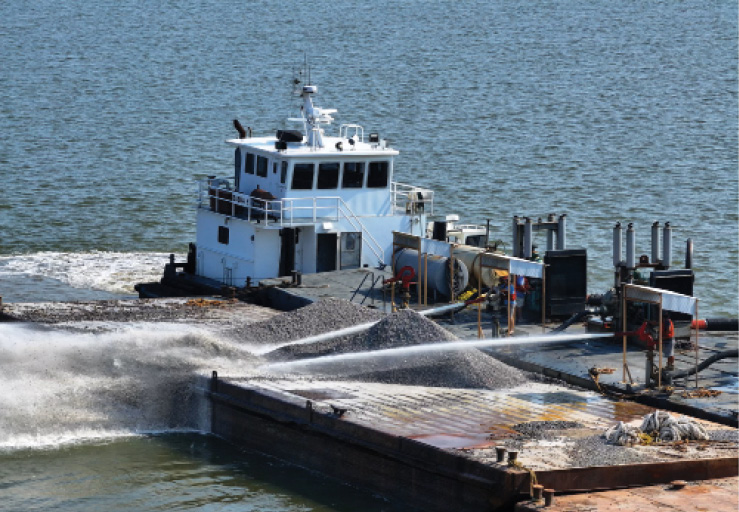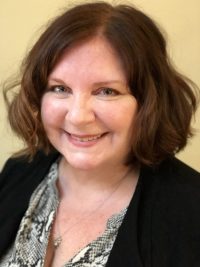Reflecting Its Cultural Values, Vulcan Joins Alabama Oyster Habitat Rehabilitation Effort.
By Therese Dunphy
Material donations are a fairly frequent occurrence for many aggregate producers, but the nation’s largest aggregates producer fielded a fairly unique request earlier this year. The Alabama Wildlife Federation (AWF) reached out to Vulcan Materials Co. for material to improve the oyster habitat in Mobile Bay. The company quickly agreed to help.
“Our leadership prioritizes environmental stewardship, which is why we have been a longtime supporter of the AWF,” noted Atisthan Roach, manager, community and government relations. Being an engaged partner in its communities is embedded in the company’s culture, she said, noting that Vulcan previously partnered with the organization to build the Alabama Nature Center, a hands-on outdoor education facility in Millbrook.
On this project, Vulcan served as a member of a coalition that included the AWF, Cooper Marine, the Coastal Land Trust, the J.L. Bedsole Foundation, and PowerSouth. The group’s goal was to support the local oyster population, which has been declining since the 1950s, and provide both ecological and economic benefits to the area.
“The AWF Cedar Point Beach Oyster Restoration Project represents a half-million-dollar project funded 100 percent by private dollars,” explained Tim Gothard, AWF executive director. “The limestone rock provided by Vulcan Materials Co., and deployed over the 77 acres of water bottom at Cedar Point Beach, provides the substrate to which oyster larvae can attach and grow.
“From an economic standpoint, the Cedar Point Beach site was selected based on its close proximity to some of Alabama’s most productive wild oyster grounds,” he added. “These wild oyster grounds provide direct income opportunities for oyster catchers, support jobs for those in the seafood industry, and those in the restaurant business that serve wild oysters for human consumption. This project will further expand those economic opportunities.”
Executing the Plan
To create the proper habitat, the right type of aggregate was required. “Not all rock is created equal,” Roach said, “and in the Gulf Coast, there just wasn’t the appropriate rock for this.” The necessary material came from Vulcan’s Pride Quarry, in Tuscumbia, which produced 6,500 tons of #4s and then washed it prior to loading the material onto four barges for transportation to the site. The barges traveled down the Tennessee-Tombigbee River to Heron Bay. Once in Mobile, the stone was deployed via a water cannon into the water to loosely disperse it and create the right habitat.

were used to spray it into the bay to create the proper habitat for oysters.
Tracking the Project
Throughout the shipment of aggregates, AWF tracked the barges’ progress with social media posts. This allowed both its partners and the public to track progress. It also drew positive attention to the project.
“I had the privilege of gathering with a group at Cedar Point Beach in Heron Bay to celebrate a privately organized and funded project that will help restore the local oyster-growing habitat,” wrote Sandy Stimpson, mayor of Mobile, in a social media post later shared by AWF. “The struggles that Alabama’s oyster industry has faced over the last 10 to 15 years have been reflected in the prices you see at local restaurants and stores. It has also significantly impacted the local industry and oystermen that have harvested the waters of south Mobile County for generations.”
“Corporate partners like Vulcan Materials are the reason projects like this can happen,” Gothard said. “Their involvement serves as a beacon to other corporate entities and inspires additional investment in important natural resource restoration and improvement initiatives.”
The AWF honored two of its partners during the deployment as it unveiled the name of the project: The Cooper Group-Vulcan Materials Co. 2023 Oyster Cultch Plant.
The Vulcan Way
While the recognition came as a nice surprise, Roach said that working with community partners is simply part of the company’s culture. “At Vulcan, we live the Vulcan Way,” she explained. “It’s doing the right thing, the right way, at the right time. In this case, we had the rock. We had the relationships. It’s the right thing to do. It’s the right thing to do for the environment. It’s the right thing to do for the Gulf Coast area. It’s going to restore the oyster population, which will be good not just for that ecosystem, but for the people whose livelihood depends upon it.”

Therese Dunphy has covered the aggregates industry for nearly 30 years, while also serving multiple roles as a public official. As the owner of Stone Age Communications, she provides communications consulting services to help aggregate producers build stronger relationships within the communities they serve. She can be reached at [email protected].
